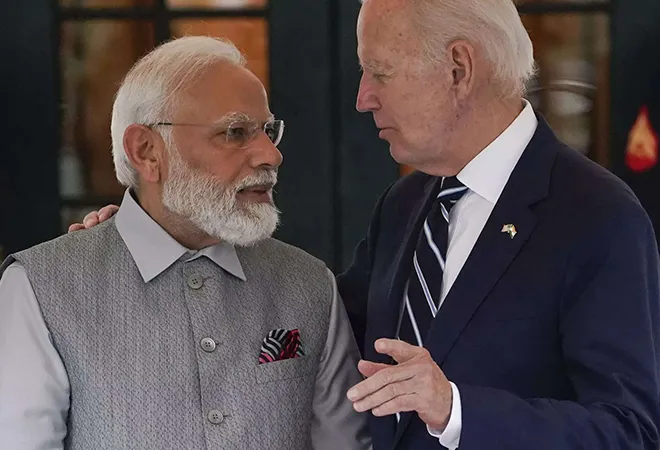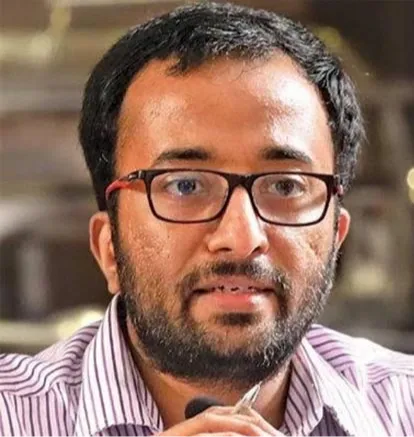-
CENTRES
Progammes & Centres
Location
By using modern tools, PM Modi has been able to revitalise traditional practices to address contemporary challenges

Prime Minister Narendra Modi has skilfully utilised the bully pulpit and modern tools like social media to mainstream ideas from past centuries, integrating them into the present. Through examples such as yoga, International Year of Millets 2023, and Mission LiFE (Lifestyle for Environment), Modi has successfully revitalised traditional practices while addressing contemporary challenges. Modi's success in implementing these transformative initiatives links to his ability to communicate a compelling narrative and rally public support around his vision of change. He has proven to be a leader willing to challenge conventional wisdom and take calculated risks to bring about meaningful transformation in the lives of ordinary citizens, across the world.
Modi's success in implementing these transformative initiatives links to his ability to communicate a compelling narrative and rally public support around his vision of change.
In a world reeling under the burden of lifestyle diseases, yoga, an ancient practice encompassing physical postures, breathing exercises, and meditation has gained increasing popularity worldwide. Modi's address to the United Nations General Assembly in 2014 led to the adoption of 21st June as the International Day of Yoga, from 2015 onwards. This global platform has brought traditional yoga practices into the modern world, emphasising accessibility, inclusivity, and integration with science, research, and technology.
Yoga diplomacy has not only enhanced bilateral relations but also promoted a positive image of India.
Using platforms such as Twitter, Facebook, and YouTube, Modi has actively promoted the International Day of Yoga, making it a worldwide celebration, positioning yoga as a modern, convenient, and accessible practice that transcends cultural and religious boundaries. By leveraging yoga as a tool for international diplomacy, Modi has projected India's soft power, fostered cultural exchange, and strengthened global engagement while helping reduce lifestyle risks for significant populations. Yoga diplomacy has not only enhanced bilateral relations but also promoted a positive image of India.
The emerging burden of non-communicable diseases (NCDs) has significant linkages to the food processing industry and the food choices it promotes. Millets, deeply rooted in India's agricultural heritage, offer nutritional benefits and sustainable agricultural practices. Recognising their potential in addressing food security, nutrition, and rural development challenges, Modi's government has spearheaded a campaign to promote millets. Their diverse agro-climatic adaptability and high nutritional value make them a valuable source of nutrition, particularly for communities with limited food options.
India's sponsorship of the United Nations' declaration of 2023 as the “International Year of Millets” highlights their significance in achieving sustainable agriculture, food security, and resilient food systems. By leveraging national and global platforms, Modi and his government have disseminated information about millets' benefits, encouraged their cultivation and consumption, and through integrating millets into the mainstream food systems, nudged the food industry to diversify options away from highly processed and nutritionally poor foods.
Millets, deeply rooted in India's agricultural heritage, offer nutritional benefits and sustainable agricultural practices.
The focus on millets represents a departure from the “whitening” of food and a shift towards embracing whole, minimally processed grains. It aligns with the goal of promoting healthier dietary choices and building a more sustainable food system that benefits both individuals and the environment, easing the pressure on health systems. Under India's G20 presidency, significant efforts have been made to promote millets as a sustainable and nutritious food source, emphasising its role in achieving food security, agricultural diversity, and resilient food systems.
Overconsumption and commodity fetishism pose significant challenges to sustainability. The relentless pursuit of material possessions and the perception of value based solely on monetary value perpetuate an unsustainable cycle. The challenge lies in promoting mindful and rational consumption to protect the environment while addressing psychological factors that drive excessive consumption. Achieving sustainability requires a shift in societal values and behaviour to promote mindful consumption and break free from the culture of overconsumption.
Reflecting this shift, Modi's conceptualisation and promotion of Mission LiFE echoes a commitment to individual and societal behaviour change for sustainable consumption and production. Modi called for LiFE to become a global mass movement, emphasising mindful and deliberate utilisation of the environment over mindless and destructive consumption. This was introduced at COP26 in Glasgow in 2021 and aligns with India's G20 presidency, highlighting the importance of LiFE and responsible decisions for national development and global action.
The challenge lies in promoting mindful and rational consumption to protect the environment while addressing psychological factors that drive excessive consumption.
By encouraging simple actions in people's daily lives, LiFE aims to make a significant contribution to addressing climate change on a global scale. The mission intends to leverage social networks to influence societal norms and create a global community called 'Pro-Planet People' (P3) committed to adopting and promoting environmentally friendly lifestyles. The campaign focuses on individual and community behaviours, seeks ideas from experts worldwide, and takes advantage of climate-friendly practices and beliefs in different cultures.
Modi's government has rallied different platforms to promote LiFE and encourage individuals and institutions to adopt environmentally responsible behaviours. By emphasising the link between individual choices and environmental impact, Modi aims to address the global environmental and climate crisis. By incorporating LiFE into education and raising awareness through social media platforms, Modi's government fosters a greener, cleaner, and more vibrant future.
Leveraging modern tools to revive and popularise ancient wisdom, thereby creating a sense of cultural continuity in the present, Prime Minister Modi has been able to strike a balance between tradition and progress, ensuring that the mainstreaming of ideas from the past aligns with the diverse needs of a rapidly evolving society. Throughout his tenure, he has been challenging the normative practices of modern political leaders by mobilising communities with calls to change the “way of life” rather than preserving the status quo. He has taken significant political risks by asking for change rather than protecting contemporary values, and interestingly, he is still able to make a wide impact, across the world.
Shoba Suri is a Senior Fellow at the Observer Research Foundation
Oommen C. Kurian is a Senior Fellow and Head of Health Initiative at the Observer Research Foundation.
The views expressed above belong to the author(s). ORF research and analyses now available on Telegram! Click here to access our curated content — blogs, longforms and interviews.

Oommen C. Kurian is Senior Fellow and Head of the Health Initiative at the Inclusive Growth and SDGs Programme, Observer Research Foundation. Trained in economics and ...
Read More +
Dr. Shoba Suri is a Senior Fellow with ORFs Health Initiative. Shoba is a nutritionist with experience in community and clinical research. She has worked on nutrition, ...
Read More +